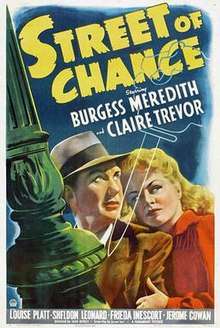Street of Chance (1942 film)
| Street of Chance | |
|---|---|
 Theatrical release poster | |
| Directed by | Jack Hively |
| Produced by | Sol C. Siegel |
| Screenplay by | Garrett Fort |
| Based on | Cornell Woolrich |
| Starring |
Burgess Meredith Claire Trevor |
| Music by | David Buttolph |
| Cinematography | Theodor Sparkuhl |
| Edited by | Arthur P. Schmidt |
Production company |
Paramount Pictures |
| Distributed by | Paramount Pictures |
Release date |
|
Running time | 74 minutes |
| Country | United States |
| Language | English |
Street of Chance is a 1942 film noir directed by Jack Hively and starring Burgess Meredith as a man who finds he's been suffering from amnesia and Claire Trevor as a woman who protects him from the police, who suspect him of murder.
The story was based on Cornell Woolrich's novel The Black Curtain. It was later dramatized three times on the CBS Radio series Suspense.
Plot
Frank Thompson awakens in the middle of the street after wreckage falling from a building in New York City hits him on the head. Frank soon discovers that his apartment has been rented out for a year and his wife Virginia has been living on her own elsewhere.
Frank confronts Virginia, who is shocked to see the husband who disappeared without explanation a year earlier. As Frank slowly pieces together his old life, it turns out he is running from a murder he cannot remember committing, and Joe Marucci, a detective, is shadowing his every move.
Ruth Dillon introduces herself and takes Frank to the mansion of the wealthy Diedrich family, where she has been employed as a servant. Family matriarch Grandma Diedrich was an eyewitness to the murder of son Harry, but she is a housebound invalid who also is mute. Through sign language, Harry learns from her that Ruth is the killer, Harry having caught her stealing. Harry's life is in danger as well until Marucci arrives and catches the culprit.
Cast
- Burgess Meredith as Frank Thompson
- Claire Trevor as Ruth Dillon
- Louise Platt as Virginia Thompson
- Sheldon Leonard as Joe Marucci
- Frieda Inescort as Alma Diedrich
- Jerome Cowan as Bill Diedrich
- Adeline De Walt Reynolds as Grandma Diedrich
- Arthur Loft as Sheriff Lew Stebbins
- Clancy Cooper as Burke
- Paul Phillips as Schoeder
- Keith Richards as Intern
- Ann Doran as Miss Peabody
- Cliff Clark as Ryan, (Policeman)
- Edwin Maxwell as Stillwell, D.A.
Reception
Film critic Dennis Schwartz liked the film and wrote, "Jack Hively efficiently directs an early film noir that establishes a number of conventions that helped define noir ... Though the murderer was too obvious by the halfway point, the film still had many disturbing moments that kept me interested."[1]
References
- ↑ Schwartz, Dennids, film review, Ozus' World Movie Reviews, December 15, 2003. Accessed: July 6, 2013.
External links
- Street of Chance on IMDb
- Street of Chance at AllMovie
- Street of Chance at the TCM Movie Database
- Street of Chance introduction on YouTube by Eddie Muller at Noir City Seattle
Streaming audio
- The Black Curtain on Suspense: December 2, 1943. Radio drama of the novel on which the film is based.
- The Black Curtain on Suspense: January 3, 1948. Radio drama of the novel on which the film is based.